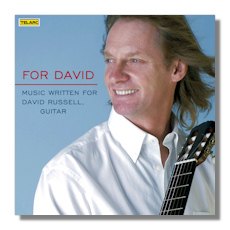
The Internet's Premier Classical Music Source
Related Links
- Latest Reviews
- More Reviews
-
By Composer
-
Collections
DVD & Blu-ray
Books
Concert Reviews
Articles/Interviews
Software
Audio
Search Amazon
Recommended Links
Site News
 CD Review
CD Review
For David

Works Composed for David Russell
- Sérgio Assad: Aquarelle
- Francis Kleynjans: Arabesque en Forme de Caprice
- Steve Goss: El Llanto de los Sueños
- Ben Verdery: Now and Ever
- Phil Rosheger:
- Waltz #7
- Lullaby to Wake Up With
- Good Luck Waltz
David Russell, guitar
Telarc CD-80707 DDD 57:08
The music on this CD was, without exception, written for and dedicated to guitarist David Russell, who has been recording for Telarc since 1995, earning a Grammy in 2004 for Aire Latino, a collection of Latino-American music for solo guitar. Russell was born in Glasgow in 1953, but his family moved to Spain when he was quite young. (He still calls that country his home.) He studied at the Royal Academy of Music in London, and won several important guitar competitions during and after. He now has over a dozen recordings on Telarc; before 1995, he recorded for several other labels.
CDs with this theme can sound more dutiful than inspired, as if the dedicatee were paying off a debt. Fortunately, that's not the impression I have this time around. These works are attractive additions not just to Russell's repertoire, but to the guitar repertoire as a whole.
It helps that all of these composers are guitarists themselves. Brazilian-born Sérgio Assad is the most famous one here. His tripartite Aquarelle (Divertimento, Valseana, and Preludio e Toccatina) is the longest work on this CD – over 13 minutes – but it is given form and unity by the use of a three-note motive, sounded right at the start, that returns in the third part. Assad's Aquarelle, composed in 1986, has been recorded by several other guitarists, and the attention that it has received is in recognition of the solid, imaginative work that Assad put into it.
The full title of Kleynjans's work is Arabesque en forme de Caprice sur le Tombeau de Tárrega, an allusion to the Spanish guitarist-composer who died in 1909. The concept of an arabesque in the form of a caprice is a little too subtle for me to grasp – is it like a mystery wrapped in an enigma? – but it's the music that matters, and Kleynjans has created a beautifully melancholy mood in this work, and the writing for guitar is particularly felicitous.
In English, Goss's work is titled "The Weeping of Tears" (an allusion to García Lorca), and it is in three sections: a prelude-like Cantiga, a hypnotic and nocturnal Madrugada, and an Alborada, which depicts the dance of an "old and slightly deranged Carmen," according to the booklet notes. Goss's more abstract style challenges the listener, and contrasts well with the other works on this CD.
Ben Verdery's Now and Ever uses an alternate tuning; the second and third strings are tuned to A sharp and A, respectively, and the tension created by that interval of a minor second drives this work, which is the composer's "musical statement against slavery of any kind." That might sound a little heavy-handed, but there's enough subtlety and subjectivity in Now and Ever to keep listeners on their toes.
As it draws to a close, the CD's tone changes with the three works by Phil Rosheger, which are tuneful and relatively straightforward, although there is something obsessive about Rosheger's melodies. The Waltz #7 might have appealed to Bernard Herrmann, and the Lullaby is touching – it seems to speak toward adult stresses more than it does toward colicky babies! The closing Good Luck Waltz is a charming finger-buster, characterized by unexpected harmonies and rhythms.
As always, Russell's playing is rhythmically alive, and his tone is warm and colorful. Hearing any of his CDs, one might say that he plays the music as if he owns it. On this CD, that's even truer than usual! Telarc has captured his sound with naturalness and all due intimacy.
Copyright © 2009, Raymond Tuttle




















